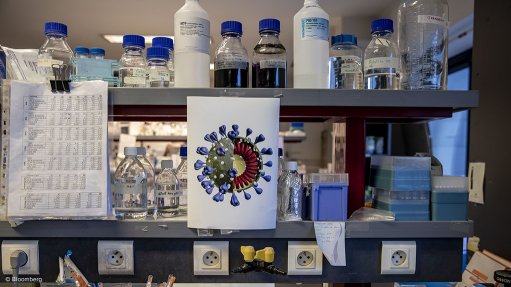
Photo by: Bloomberg
Focus on frontline worker safety is being put in the spotlight in a new clinical trial, run by scientists from the University of the Witwatersrand (Wits) and the University of Cape Town (UCT), to test whether childhood vaccines can protect healthcare workers from Covid-19 or the subsequent effects of the virus for those who become infected.
The clinical trial will aim to work as a strategy to save lives and prevent the collapse of healthcare services and will test whether the childhood vaccine for measles, mumps and rubella (MMR) can protect frontline healthcare workers.
UCT infectious diseases Professor Linda-Gail Becker says a focus on the safety of healthcare workers is an essential cornerstone to an effective pandemic response.
The team is referencing growing evidence that suggests that the MMR vaccine may have benefited beyond protecting against measles, mumps and rubella, and that it could broadly boost an individual’s immunity and may prevent infection from SARS-CoV-2 for a limited period.
The team explained that this was because the vaccine carried small amounts of live, weakened viruses that could train the body’s immune system to fight multiple pathogens.
Healthcare workers will be recruited from South Africa, Zambia, Zimbabwe, Ghana, Uganda, the US, the UK and Ireland and split into two groups.
One group will receive the MMR vaccine and the other will receive an inactive placebo.
Each participant will be followed for five months and the entire trial is expected to last about a year.
The South African team hope to enrol up to 5 000 health care workers in several sites in Gauteng, the Western Cape, Free State and KwaZulu-Natal.
Wits Reproductive Health and HIV Institute research professor Sinead Delany-Moretlwe explains that the MMR vaccine, which contains small amounts of weakened measles, mumps and rubella viruses, seems to strengthen the body’s immune response to infections in general, not just to the viruses in that particular vaccine.
There are also similarities between the weakened viruses in the vaccine and the SARS-CoV-2 virus, which causes Covid-19.
“All of these viruses have similar proteins on their surfaces that are involved in infecting cells in the body, so the researchers think that antibodies made in response to the MMR vaccine also may recognise and fight the SARS-CoV-2 virus,” adds Delany-Moretlwe.
The research team warns that the MMR vaccine will not be used to aid recovery from illness, however, they want to learn whether the vaccine can cause an immune response that slows the spread of the virus and protects frontline healthcare workers who are at a higher risk of contracting the virus.
Meanwhile UCT national co-principal investigator and second chair in the Department of Anaesthetics Professor Bruce Biccard says this approach is complementary to the search for specific SARS-CoV-2 vaccines.
“If the trial shows that the MMR vaccine can boost the body’s immune response, we believe it also may enhance the effectiveness of vaccines currently in development to prevent SARS-CoV-2 infection,” he says.